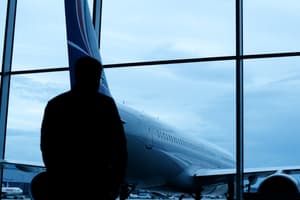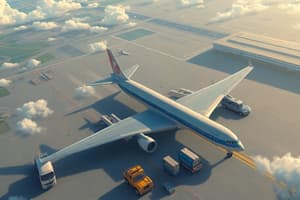Podcast
Questions and Answers
Which of the following scenarios primarily falls under airside operations at an airport?
Which of the following scenarios primarily falls under airside operations at an airport?
- Directing aircraft movements on the taxiways to prevent runway incursions. (correct)
- Managing traffic flow in the passenger drop-off zone.
- Providing wheelchair assistance to passengers in the terminal.
- Coordinating baggage check-in at the terminal.
Efficient traffic flow and parking management are most critical for which aspect of airport operations?
Efficient traffic flow and parking management are most critical for which aspect of airport operations?
- Ramp services
- Airside operations
- Terminal management
- Landside operations (correct)
Which of the following activities is least likely to be a part of terminal management?
Which of the following activities is least likely to be a part of terminal management?
- Managing passenger flow to minimize congestion.
- Ensuring efficient and thorough security screening.
- Coordinating aircraft arrivals and departures at gates.
- Performing routine maintenance on runways. (correct)
Which scenario exemplifies a ramp service within ground handling operations?
Which scenario exemplifies a ramp service within ground handling operations?
A passenger requiring wheelchair assistance to navigate through the airport would be supported by which type of service?
A passenger requiring wheelchair assistance to navigate through the airport would be supported by which type of service?
Which of the following best describes an activity performed under Aircraft Services?
Which of the following best describes an activity performed under Aircraft Services?
How does the implementation of automated baggage handling systems primarily enhance airport operations?
How does the implementation of automated baggage handling systems primarily enhance airport operations?
Which security measure is specifically aimed at preventing unauthorized access to restricted airport areas?
Which security measure is specifically aimed at preventing unauthorized access to restricted airport areas?
What is the purpose of Safety Management Systems (SMS) in airport operations and ground handling services?
What is the purpose of Safety Management Systems (SMS) in airport operations and ground handling services?
Why is wildlife management a critical component of airside operations?
Why is wildlife management a critical component of airside operations?
How do real-time information displays contribute to enhancing the passenger experience in terminal management?
How do real-time information displays contribute to enhancing the passenger experience in terminal management?
Which of the following ground handling services involves the use of specialized vehicles to reposition an aircraft?
Which of the following ground handling services involves the use of specialized vehicles to reposition an aircraft?
De-icing services are considered an essential part of aircraft services during winter weather conditions primarily because they:
De-icing services are considered an essential part of aircraft services during winter weather conditions primarily because they:
Which of the following scenarios highlights the importance of efficient gate management within terminal operations?
Which of the following scenarios highlights the importance of efficient gate management within terminal operations?
Which activity is part of landside operations that aims to integrate the airport with the broader public transportation network?
Which activity is part of landside operations that aims to integrate the airport with the broader public transportation network?
What is the primary reason for performing regular maintenance checks on airport runways?
What is the primary reason for performing regular maintenance checks on airport runways?
How do electronic flight strips primarily improve air traffic control (ATC) efficiency?
How do electronic flight strips primarily improve air traffic control (ATC) efficiency?
What is the role of predictive maintenance in airport operations?
What is the role of predictive maintenance in airport operations?
What is the main goal of having emergency response plans in place at airports?
What is the main goal of having emergency response plans in place at airports?
How do cybersecurity measures protect airport systems from cyber threats?
How do cybersecurity measures protect airport systems from cyber threats?
Flashcards
Airport Operations
Airport Operations
Activities required to keep an airport functioning safely and efficiently.
Ground Handling Services
Ground Handling Services
Services required to support an aircraft between arrival and departure at a terminal gate.
Airside Operations
Airside Operations
Activities that occur on the movement area of an airport, including runways, taxiways, and aprons.
Landside Operations
Landside Operations
Signup and view all the flashcards
Terminal Management
Terminal Management
Signup and view all the flashcards
Ground Handling
Ground Handling
Signup and view all the flashcards
Ramp Services
Ramp Services
Signup and view all the flashcards
Passenger Services
Passenger Services
Signup and view all the flashcards
Aircraft Services
Aircraft Services
Signup and view all the flashcards
Baggage Handling
Baggage Handling
Signup and view all the flashcards
Ground Power Units (GPUs)
Ground Power Units (GPUs)
Signup and view all the flashcards
Catering
Catering
Signup and view all the flashcards
Automated Baggage Systems
Automated Baggage Systems
Signup and view all the flashcards
Self-Service Kiosks
Self-Service Kiosks
Signup and view all the flashcards
Airport Safety and Security
Airport Safety and Security
Signup and view all the flashcards
De-icing
De-icing
Signup and view all the flashcards
Aircraft Towing
Aircraft Towing
Signup and view all the flashcards
Surveillance Systems
Surveillance Systems
Signup and view all the flashcards
Pushback
Pushback
Signup and view all the flashcards
Safety Management Systems (SMS)
Safety Management Systems (SMS)
Signup and view all the flashcards
Study Notes
- Airport operations encompass all activities required to keep an airport functioning safely and efficiently.
- Ground handling services refer to the various services required to support an aircraft between the time it arrives at a terminal gate and the time it departs.
Airport Operations
- Airport operations are crucial for the safe and efficient movement of aircraft, passengers, and cargo.
- They involve a wide range of activities, from air traffic control to ground maintenance.
- Safety regulations and standards are paramount in airport operations.
- Key areas include airside operations, landside operations, and terminal management.
Airside Operations
- Airside operations encompass all activities that occur on the movement area of an airport.
- The movement area includes runways, taxiways, and aprons.
- Activities include aircraft movement, runway maintenance, wildlife management, and safety inspections.
- Air traffic control (ATC) is a critical component, directing aircraft movements to prevent collisions.
- ATC manages takeoffs, landings, and ground movements.
- Runway maintenance involves regular inspections, cleaning, and repairs to ensure a safe surface for aircraft operations.
- Wildlife management is crucial to prevent bird strikes and other wildlife hazards.
- Safety inspections are conducted regularly to identify and mitigate potential risks.
Landside Operations
- Landside operations involve activities that occur in the areas accessible to the public.
- These include parking facilities, roadways, and public transportation access points.
- Efficient traffic flow and parking management are essential for passenger convenience.
- Security measures are also critical in landside operations, including vehicle screenings and surveillance.
- Crowd management and passenger assistance are important aspects.
- Maintaining roadways and pedestrian areas ensures safe access to the terminal.
- Coordination with local transportation authorities helps integrate the airport with the broader transportation network.
Terminal Management
- Terminal management focuses on the efficient and comfortable processing of passengers and baggage.
- Key activities include check-in, security screening, gate management, and baggage handling.
- Passenger flow management is crucial to minimize congestion and delays.
- Security screening must be efficient and thorough to ensure passenger safety.
- Gate management involves coordinating aircraft arrivals and departures.
- Baggage handling systems must be reliable to ensure that baggage is processed quickly and accurately.
- Customer service is a vital aspect of terminal management, including information desks and assistance for passengers with special needs.
- Retail and food concessions contribute to the overall passenger experience.
- Efficient use of space and resources is a constant priority.
Ground Handling Services
- Ground handling services ensure the safe and efficient turnaround of aircraft at an airport.
- These services are typically provided by specialized companies or the airline itself.
- Key categories include ramp services, passenger services, and aircraft services.
- Efficient ground handling is critical for on-time performance and customer satisfaction.
- Safety is a paramount concern in all ground handling activities.
Ramp Services
- Ramp services involve activities that occur on the apron, close to the aircraft.
- These include baggage handling, cargo loading and unloading, aircraft refueling, and aircraft towing.
- Baggage handling involves the safe and efficient transfer of baggage between the terminal and the aircraft.
- Cargo loading and unloading require specialized equipment and trained personnel.
- Aircraft refueling must be done safely and accurately, following strict procedures.
- Aircraft towing is used to move aircraft between gates and maintenance areas.
- Pushback from the gate prior to taxiing is another key ramp service.
- Ground power units (GPUs) and air conditioning units are connected to the aircraft while it is on the ground.
Passenger Services
- Passenger services focus on assisting passengers during their time at the airport.
- These include check-in assistance, gate information, boarding assistance, and special assistance for passengers with disabilities.
- Check-in assistance includes helping passengers with baggage check-in and seat assignments.
- Gate information is provided to passengers to keep them informed about flight status and boarding times.
- Boarding assistance ensures that passengers board the aircraft in an orderly and efficient manner.
- Special assistance includes providing wheelchairs, escort services, and other accommodations.
- Lost and found services fall under passenger services.
- Handling passenger complaints and inquiries is an important aspect.
Aircraft Services
- Aircraft services involve activities that ensure the aircraft is ready for its next flight.
- These include cabin cleaning, catering, lavatory servicing, and aircraft maintenance checks.
- Cabin cleaning involves removing trash, cleaning seats, and restocking supplies.
- Catering involves loading food and beverages onto the aircraft.
- Lavatory servicing includes emptying and cleaning the aircraft lavatories.
- Aircraft maintenance checks are performed to ensure that the aircraft is in safe operating condition.
- De-icing services are crucial during winter weather.
Technology in Airport Operations and Ground Handling
- Technology plays an increasingly important role in enhancing efficiency, safety, and the passenger experience.
- Automated baggage handling systems improve speed and accuracy.
- Self-service kiosks and mobile check-in options reduce wait times.
- Real-time information displays provide passengers with up-to-date flight information.
- Surveillance systems enhance security.
- Data analytics can be used to optimize operations and resource allocation.
- Communication systems facilitate coordination between various airport stakeholders.
- Electronic flight strips improve air traffic control efficiency.
- Predictive maintenance helps prevent equipment failures.
Safety and Security
- Safety and security are paramount in both airport operations and ground handling services.
- Strict adherence to regulations and procedures is essential.
- Regular training and drills prepare personnel for emergencies.
- Security screenings are conducted to prevent prohibited items from entering the airport.
- Background checks are performed on employees with access to secure areas.
- Surveillance systems monitor airport activity.
- Emergency response plans are in place to address potential crises.
- Cybersecurity measures protect airport systems from cyber threats.
- Safety management systems (SMS) are used to proactively identify and mitigate risks.
Studying That Suits You
Use AI to generate personalized quizzes and flashcards to suit your learning preferences.



